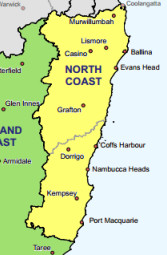The North Coast NSW Medicare Local (NCML) has been chosen by the federal government to run the North Coast Primary Health Network (NCPHN), operating from 1 July 2015.
It is understood that the same geographical/clinical footprint will apply under the new structure – in North-South terms, from Tweed Heads to Port Macquarie.
While operating across this large area will continue to be a challenge, the announcement can be seen as a major ‘win’ for NCML as the nation’s present 61 Medicare Locals will be halved to 31 PHNs.
The restructuring is the latest iteration of the Commonwealth’s involvement in primary care provision, and follows a review of the Medicare Local structure.
One key recommendation of Professor John Horvath’s review was to change the program’s name in order to avoid public confusion: are Medicare Locals a place to visit to get Medicare refunds? Apparently many patients think they are.
Better alignment with Local Health Districts was another aim. As before, the boundary of the new NCPHN will dovetail with the Northern NSW and Mid North Coast LHDs (formerly the single North Coast Area Health Service).
While some of Australia’s MLs were deemed to have under-performed, the North Coast operation was generally regarded as successful.
Welcoming the government’s announcement, NCML Board Chair Tony Lembke said the PHNs would work directly with general practice, other health care providers, hospitals and the broader community to improve outcomes, access, quality and teamwork.
“The NCML Board and staff are excited to be given the opportunity to establish and operate the North Coast Primary Health Network,” Dr Lembke said.
NCML CEO Vahid Saberi said he expects the next three months to be demanding.
“The first priority is to ensure no interruption of the current extensive portfolio of services delivered to the community."
“At the same time we need to ensure that the organisation is reflective of the Commonwealth’s expectations; that our strategies are aligned to our regional and local capabilities and needs; and that our governance and management structures are fit for achieving the NCPHN aims and objectives.”
Mr Saberi added, “When we submitted our application to establish the NCPHN in December 2014, we received nearly 70 letters of support from across the health and social services. We are grateful to our partners and collaborators for their trust, confidence and generosity.”
Dr Lembke said a key task over the next three months will be to consult with the organisation’s many collaborators in the health and community sectors.
“We appreciate that we need to work in close partnership to harness the skills, knowledge and resources of our many partners to improve the efficiency of the system and make it easier for patients to receive high quality care.”
















